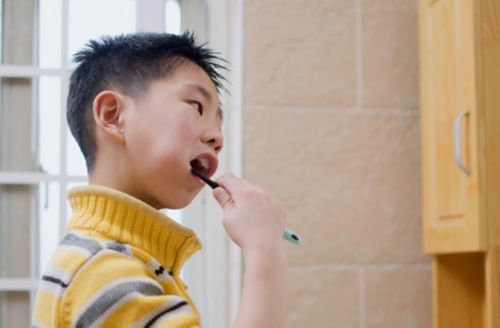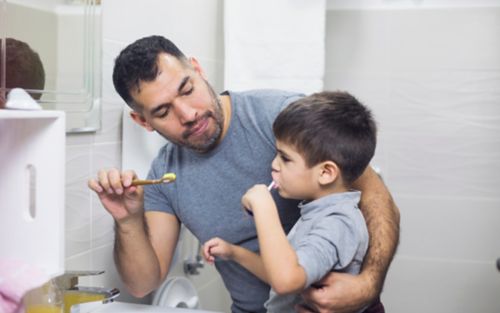Brushing your teeth twice a day is always a good idea. It is even more important for children under treatment for serious illnesses such as cancer and blood disorders.
Certain chemotherapy and radiation treatments can cause conditions to develop in the teeth, gums, and mouth.
Risk factors for oral problems
- Chemotherapy in patients before their permanent teeth were fully formed, especially if they were younger than 5
- Chemotherapy for a long period of time
- Radiation therapy to the head/ neck area
Daily care of the teeth, gums, and mouth can prevent certain problems. It may also lessen some painful side effects. Poor dental habits can make problems worse.
Possible conditions may include:
- Increased risk of cavities
- Shortening or thinning of the roots of the teeth or absence of teeth or roots
- Problems with tooth development such as small teeth, early loss of teeth, or baby teeth not falling out
- Problems with development of tooth enamel causing white or discolored patches, grooves and pits, and easy staining
- Facial abnormalities, including overbite, underbite, or facial asymmetry
- Gum disease
- Dry mouth
- Mouth and throat sores (mucositis)
- Difficulty swallowing
- Difficulty chewing or opening the mouth
- Scarring and hardening of the jaw muscles
- Swelling or pain in the lining of the mouth and tongue
Regular visits to the dentist
Patients should visit the dentist regularly before, during, and after the completion of therapy.
Before treatment
If possible, have a dental exam before treatment begins. But a dental exam or procedures may not be possible after therapy has begun.
Braces and other orthodontic devices may need to be removed before treatment to prevent oral complications such as gingivitis, mucositis, and dental decay from occurring inside the mouth.
During treatment
Families should consult their child’s care team about the timing of dental visits after treatment begins. They should also alert the team if any dental issues occur.
The dentist will work with other care team members. They will make decisions on dental care based on the patient’s current dental health and how treatment may have an impact. For example, the team may delay dental procedures when patients are at increased risk for infection or excessive bleeding.
After treatment
Patients may develop dental conditions years after therapy is over.
If possible, you may want to look for a dentist familiar with the effects of treatment on oral health. The care team may have recommendations.
Tell your dentist about the treatment you received and share a copy of your survivorship care plan if you have one.
Consequences of poor dental hygiene
Poor dental hygiene can lead to cavities. A cavity could quickly become a serious infection in a child undergoing therapy. If an infection is not treated, it could spread and become life threatening.
Poor dental care may also lead to gum disease.
Treatments for oral problems
If problems occur, there are types of oral care and dental work that can help:
- Permanent teeth that do not develop normally or missing teeth — Patients may need procedures that improve the function of their teeth. These procedures may include permanent crowns, removal of teeth, implants, or possibly a prosthetic device.
- Poor bone growth of the face or jaw — Sometimes reconstructive surgery can help.
- Difficulty moving jaw muscles — The dental team may recommend occupational therapy or stretching exercises.
Learn Home Care After Oral Surgery




